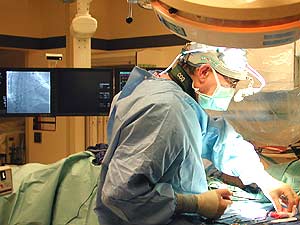|
Audio
Photos
More from MPR
Resources
Respond to this story
|
Guidant a player in treating heart disease with hardware
December 13, 2004
Health products giant, Johnson & Johnson, is expected to announce it will buy Indianapolis-based Guidant, a medical device maker with about 3,000 employees in Minnesota. Guidant is a major player in a rapidly growing area of using hardware, instead of drugs, to treat heart disease.
St. Paul, Minn. — At Abbott Northwestern Hospital in Minneapolis, a woman with chest pain has just arrived in an ambulance. She's rushed to a room called a cath (short for catheterization) lab. A cardiologist asks about the pain in her chest as he prepares to treat her.
 | |||
The patient is about to get a stent, a tiny metal scaffold that will prop open the artery that's clogged and causing her trouble.
Dr. Rob Schwartz of the Minneapolis Heart Institute says before stents, doctors could prop open an artery, but "you were never really sure what was going to happen. Sometimes, you'd get these spectacular results and the patients would do well for years and years and years," says Schwartz. "Other times the artery would close down in the cath lab, a very scary scenario, where the patient could literally die right in front of your eyes."
Schwartz says stents, which keep the artery open, have put an end to those scary days.
Abbott Northwestern President Denny DeNarvaez says the growing use of stents is taking a bite out of bypass procedures.
 | |||
"Just in the last, I would say, three to five years, we have seen open heart surgery decline 25 to 30 percent, and that has been more than offset by the growth in stenting," says DeNarvaez.
Guidant has been a leader in stents, but last year fell behind other firms, including Johnson & Johnson, that have introduced a new type of stent which helps prevent scar tissue from re-clogging an artery.
But Guidant's Arden Hills-based cardiac rhythm management business is a strong No. 2 in making devices that regulate heartbeats.
In another room near the cath lab, Dr. Charles Gornick is implanting a pacemaker in a patient's chest. Pacemakers help speed up a slow heart beat. Newer devices called defibrillators, like the one in Vice President Dick Cheney, can prevent an erratic, ineffective and potentially fatal heartbeat -- or return one to normal. These devices are treating an increasing number of conditions and patients, and Gornick says he expects the number of procedures to grow.
 | |||
"We implant a lot of devices, and as the indications have broadened for device therapy, we anticipate double-digit increases in the number of implants we do here at Abbott over the next several years," says Gornick.
Abbott Northwestern officials say stenting and device implants are two of the fastest growing areas of cardiology at the hospital.
There are several factors pushing that growth at Abbott and elsewhere. The baby boomers are getting older. Risk factors for heart disease, like obesity, diabetes and high blood pressure, are on the rise. Awareness of defibrillators is also increasing.
The trends have fueled a building boom among Twin Cities hospitals, where five new specialized heart care centers are in the works or already open.
The trends have helped boost Guidant's financial results as well.
 | |||
Sales of the company's implantable defibrillators grew by almost 50 percent, to $1.5 billion last year.
Medical technology analyst Thomas Gunderson with Piper Jaffray in Minneapolis says for a long time, many of the heart-related diseases were treated only with pills. But he says the next blockbuster heart drug is still a ways off, and that has left an opportunity for device-based treatments.
"There's more people with underlying heart disease -- that's just the demographic -- who live longer because of a history of better pharmaceuticals that have lowered blood pressure, and lowered cholesterol, and now are in advanced stage, where pharmaceuticals may not work as well," says Gunderson. "And in comes new technology that can actually help."
Johnson & Johnson's product lineup lacks an implantable defibrillator, which Gunderson calls one of the more interesting, faster-growing, and higher-profit products, and he says buying Guidant would fill that gap.
|
News Headlines
|
Related Subjects
|

